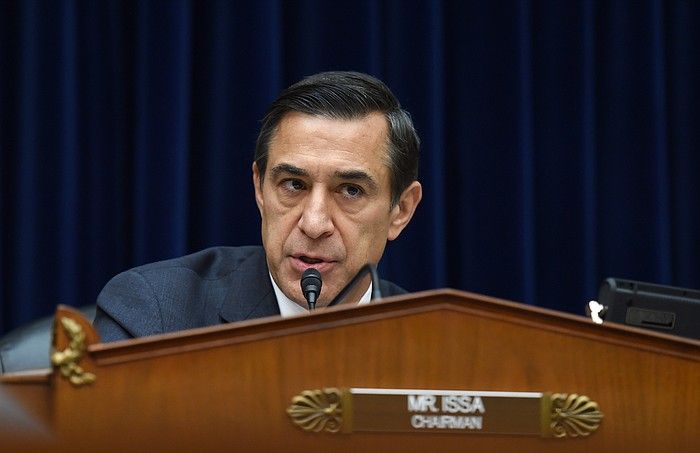Rep. Darrell Issa leads bipartisan push for visa reform
 With contending pieces of legislation now up for consideration in Congress, California has returned to the national spotlight on one of the most contentious immigration issues — special visas granted by the federal government to attract foreign talent.
With contending pieces of legislation now up for consideration in Congress, California has returned to the national spotlight on one of the most contentious immigration issues — special visas granted by the federal government to attract foreign talent.
Long critiqued by economic nationalists, including some Democrats, the H-1B visa program has been accused of undercutting qualified candidates in key industries who are U.S. citizens. “The H-1B program offers 65,000 visas each fiscal year, with an additional 20,000 reserved for foreign workers who have advanced degrees from U.S. colleges and universities,” according to Ars Technica. “The visas are awarded by lottery each year. Last year, the government received more than 236,000 applications for those visas.”
With the prestige, economic importance and compensation level attached to those jobs, they have become a focus of reform for allies of President-elect Donald Trump. “Rep. Darrell Issa, one of the highest-profile Republicans in Congress and a supporter of Mr. Trump, said Wednesday in a statement on his website that he is reintroducing a bill designed to ‘stop the outsourcing of American jobs’ and ensure laws are not ‘abused to allow companies to outsource and hire cheap foreign labor from abroad,'” The Wall Street Journal reported. The bill would seek to achieve that outcome by hiking “required salaries for positions granted under the H-1B scheme that replace American workers from $60,000 to $100,000 per year,” according to the Journal.
Bipartisan frustration
In a sign of the cross-cutting partisan interests shaking up some established battle lines on immigration, Issa boasted a Democrat, fellow Californian Rep. Scott Peters, as the co-sponsor of the Protect and Grow American Jobs Act. Silicon Valley, where political allegiances at the end of the Obama era have begun to shift in new ways, has come under attack for its use of H-1Bs. “In 2013, the top nine companies acquiring H-1B visas were technology outsourcing firms, according to an analysis by a critic of the H-1B program,” Ars Technica recalled, noting that Microsoft rounded out the list’s top 10. “The thinking goes that if minimum H-1B salaries are brought closer to what high-skilled tech employment really pays, the economic incentive to use it as a worker-replacement program will drop off.”
But other big California corporations have not been left out of the criticism. “It’s specifically required that there be a shortage” in qualified candidates, Issa said of Southern California Edison, which he attacked for asking “employees being laid off to train their replacements,” as U-T San Diego noted.
“Edison said at the time of the layoffs that it was ‘not hiring H-1B workers to replace displaced employees. Any H-1B visa workers SCE does hire for its own workforce are paid a wage comparable to SCE’s domestic workforce. Disney and a handful of other California companies have been criticized in recent years for similar moves.”
Dueling drafts
Issa and Scott’s path forward has been complicated, however, by legislative competition from one of his fellow California delegates to Congress. “Rep. Zoe Lofgren, a Santa Clara County Democrat, warned Thursday that she believes Issa’s bill could undermine Silicon Valley’s job market,” the San Jose Mercury News reported. “That’s because tech companies in a location such as Silicon Valley, where software engineers can command a starting wage of $140,000 a year, might still have incentives to use foreign workers for $100,000, Lofgren said.”
Casting her alternative as a return to the original intent of U.S. visa laws to attract the so-called best and brightest, Lofgen recently announced the details of a draft bill that will circulate formally in several weeks’ time. “Under her plan, employers who pay as much as 2.5 times to three times the prevailing wage in their metro area would get first preference to hire people through the H-1B visa program,” according to the Mercury News. Lofgren has suggested that Issa’s intended fix could leave some problems intact. “Raising the wage from $60,000 to $100,000 would do nothing to prevent the sort of outsourcing abuse we’ve seen under the H-1B visa program,” she warned, according to the paper.
Related Articles
CA faces dueling death penalty initiatives
Activists on both sides of the death penalty debate were poised for an election day clash, with one group pushing
Legislator wants domestic violence, political intimidation denounced equally
Following renewed calls from members of the legislature’s women’s caucus for Assemblyman Roger Hernández to step down amid domestic violence
Does CA suffer a doctor shortage?
Most of the criticism of the Affordable Care Act rollout has been aimed toward rate shocks, canceled insurance policies and




